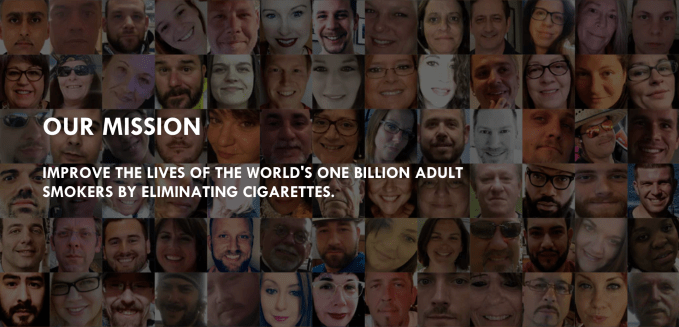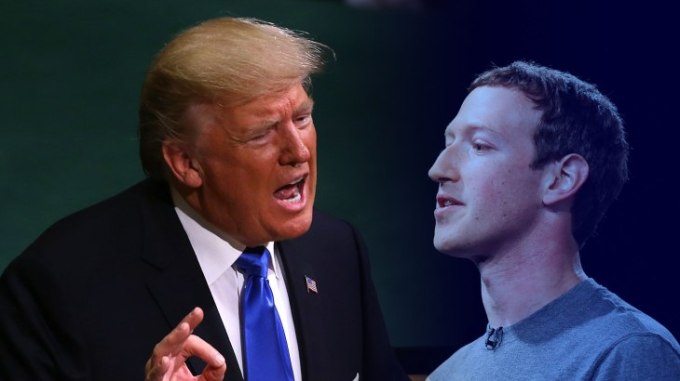Hey everyone. This is Week-in-Review, where I give a heavy amount of analysis and/or rambling thoughts on one story while scouring the rest of the hundreds of stories that emerged on TechCrunch this week to surface my favorites for your reading pleasure.
Last week, I talked about how streaming networks were undoing their advantages and making way for a renewed era of piracy.

Some mission statements leave an awful lot of room for collateral damage
The big story
In the startup world, moral relativism seems to be a guiding force. But in order for this system to work, you need some sort of north star for wrongdoing. That can be hard to find though, so often missteps from Uber or Facebook of some other startup are said to be drowning in nuance and plagued by numerous stakeholders.
But, thankfully, there’s Juul, a company that’s website is devoted to its values so that its real world impact doesn’t have to be.
This week, the startup’s CEO stepped down and was replaced by a Big Tobacco exec, a truly fitting development for a company that has long tried to maintain a moral high ground based on the alternative facts of the reality at hand. Things aren’t looking too good for Juul these days, but it’s not because the startup had a come to Jesus moment on its own, it’s because the White House and FDA are pissed and threatening to pull a nuclear option and ban flavored cartridges, which account for 80% of Juul’s sales.
Why? Because Juul’s fruity flavors were heading straight into teenagers’ hands, because they were too good not to traffic, addictive, some might say. Over the course of last year, high school student use of tobacco surged 38% thanks to a 78% surge in e-cigarette use, according to a report by the CDC. That, aligned with some unfortunately-timed mystery vaping disease possibly caused by counterfeit THC cartridges, has plunged the company into a regulatory crisis and Altria into into an identity crisis.
In December of last year, Altria bought 35% of Juul for $12.8 billion, in a deal that valued the startup at $38 billion. Following the deal, employees got massive bonuses, divvying up $2 billion in Altria cash, in large part to lessen the sour taste of a deal with Big Tobacco.
In the deal’s aftermath, then-CEO Kevin Burns tried to soften the optics, “We understand the controversy and skepticism that comes with an affiliation and partnership with the largest tobacco company in the US. We were skeptical as well,” he wrote in a statement. “But over the course of the last several months we were convinced by actions, not words, that in fact this partnership could help accelerate our success switching adult smokers.”
The deal was a hail mary for Altria, and one that increasingly appears to be heading to a receiver-less end zone. In the past five months, Altria has seen its share price slide 30 percent to a five-year low, largely as its redemption bet on Juul has faded as the regulatory environment has shifted in an extremely hostile direction. This all leads to this week, when the Burns stepped down as CEO and was replaced by Altria exec K.C. Crosthwaite.
In the case of Juul, the mission may have differed from the reality at hand, but it always made for a great story, a good one for execs and investors and recruiters and marketers and engineers and interns to tell when their ethics were called into question, but eventually the charade lifts and you get to see that the soul of your startup isn’t so metallic, sleek and full of Silicon Valley ideals, it’s just a different kind of tar black.
Send me feedback
on Twitter @lucasmtny or email
lucas@techcrunch.com
On to the rest of the week’s news.

Trends of the week
Here are a few big news items from big companies, with green links to all the sweet, sweet added context:
- TechCrunch’s Galaxy Fold gets damaged after one day
TechCrunch escaped a busted Galaxy Fold unit the first time around, though other reviewers’ issues led to a lengthy delay and a product rethinking, but in reviewing our “new-and-improved” Galaxy Fold unit, we suffered a damaged screen after just over one full day with the device. We were pretty generous in noting the things that it could have been the cause, but at the end of the day you shouldn’t have to handle your $2,000 smartphone with kids’ gloves. Read more here. - Amazon launches more Alexa devices
Amazon’s annual event — where they toss a bunch of Alexa-enabled junk into the wild — has come! Alexa glasses and Alexa rings, Alexa Echos and glow-y orb things. See them all here. - Facebook is officially preparing to ditch like counts (in Australia)
Facebook is ready to make a big change to how users see other people’s content, hiding how many likes posts have received in a test taking place in Australia. Read more here.

(Photo by David Ramos/Getty Images)
GAFA Gaffes
How did the top tech companies screw up this week? This clearly needs its own section, in order of badness:
- Facebook gives the politicians of the world a free pass:
[Facebook promises not to stop politicians’ lies and hate] -
Apple gives keyboard apps a bit too much access:
[Apple says a bug may grant ‘full access’ to third-party keyboards by mistake]

(Photo by Kimberly White/Getty Images for TechCrunch)
Disrupt SF
Our biggest event of the year is right around the corner and we’re bringing in some of the most important figures in the tech industry. Here’s who’s coming to Disrupt SF 2019.
- Ellen Pao, Tracey Chou and Harry Glaser are coming to Disrupt
- Bird CEO Travis VanderZanden talking scooters at Disrupt SF
In addition to taking in the great line-up of speakers, you can roam around Startup Alley to catch the more than 1,000 companies showcasing their products and technologies. And of course the Startup Battlefield competition that launched the likes of Dropbox, Cloudflare and Mint will once again be one of the biggest highlights of Disrupt SF.
Sign up for more newsletters in your inbox (including this one) here.



